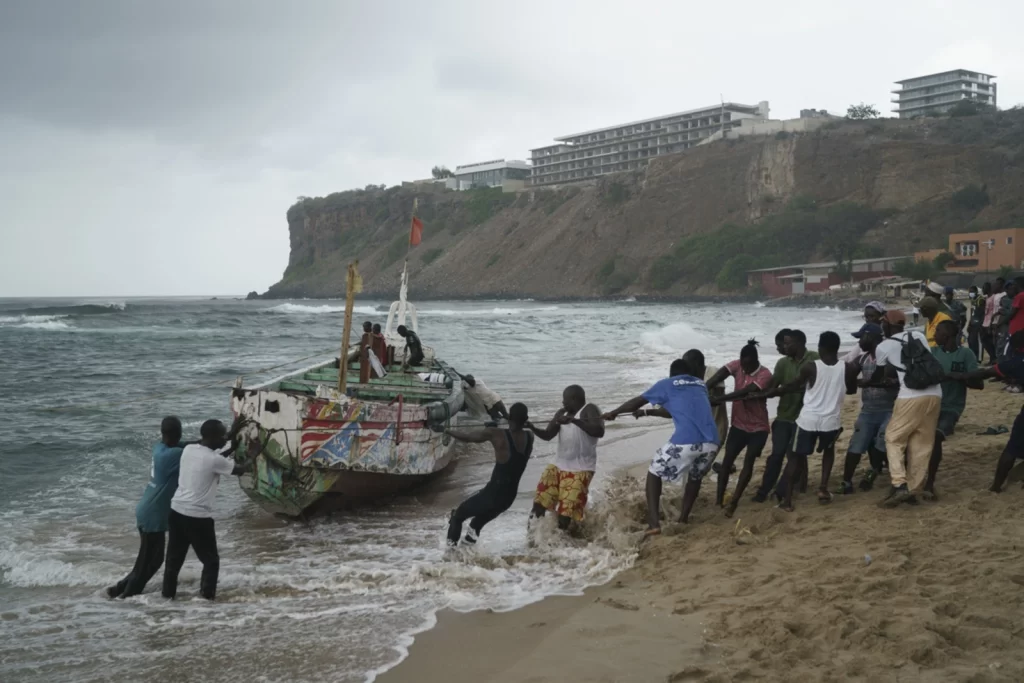Boat with 30 decomposing bodies found off Senegal coast
3 min read

A grim discovery was made off the coast of Senegal, where military authorities have recovered at least 30 decomposing bodies from a wooden boat, or pirogue. The Senegalese navy was alerted to the vessel, which was adrift approximately 70 kilometers (45 miles) from the capital, Dakar. They brought the boat to port on Monday morning.
In an official statement shared on social media, the military described the situation as deeply troubling, noting that “recovery, identification, and transfer operations are being made extremely delicate by the advanced state of decomposition of the bodies.” This condition suggests that the deceased migrants had likely been at sea for several days before being discovered.
The tragedy comes amid a surge in the number of migrants attempting to reach Spain’s Canary Islands from Senegal. This perilous journey spans over 1,500 kilometers (approximately 950 miles) across the Atlantic Ocean, a route increasingly favored by those seeking a better life in Europe. Given the state of the remains, it is suspected that the migrants had been adrift for an extended period, highlighting the dangers of this often desperate venture.
Investigations are currently underway to ascertain the boat’s point of departure and the total number of individuals on board. The army is working to piece together the circumstances that led to this tragic incident.
This is not an isolated occurrence. In August, at least 14 decomposing bodies, believed to be those of Senegalese migrants, were found off the coast of the Dominican Republic by a local fisherman. Such events underscore the growing risks faced by migrants attempting dangerous sea crossings in search of safety and opportunity.
In response to the rising number of migrant deaths, the Senegalese government announced a comprehensive 10-year plan in August aimed at addressing illegal migration. This initiative comes as authorities have intercepted hundreds of migrants attempting to leave the country in recent weeks, underscoring the severity of the ongoing crisis.
Despite these frequent tragedies, the underlying issues driving young people to embark on such dangerous journeys remain unresolved. High unemployment rates, persistent conflict, and widespread poverty continue to push many West Africans, particularly young men, to risk everything for a chance at a better life. The sea route to the Canary Islands offers a single, albeit hazardous, crossing compared to the grueling dual trek across the Sahara Desert and the Mediterranean Sea.
Local fishermen in Senegal are also feeling the strain of these challenging circumstances. Many have reported difficulties sustaining their livelihoods due to the presence of foreign trawlers along the coast, which deplete fish stocks and reduce their catch. As a result, some fishermen have turned to aiding people smugglers by offering their boats for these perilous journeys.
The European border agency Frontex has documented a significant increase in migration via the Atlantic route. In 2023, the agency reported a staggering 161% rise in crossings compared to the previous year. According to the United Nations, approximately 40,000 migrants successfully reached the Canary Islands last year, but nearly 1,000 are known to have died or gone missing during the journey. However, many experts believe the actual number of fatalities is likely far greater.
This recent tragedy serves as a stark reminder of the dire conditions faced by migrants and the urgent need for comprehensive solutions to the complex issues driving this humanitarian crisis. As the situation continues to evolve, the international community must grapple with how to address both the immediate dangers of migration and the long-standing socio-economic factors that compel individuals to leave their homes in search of a better future.